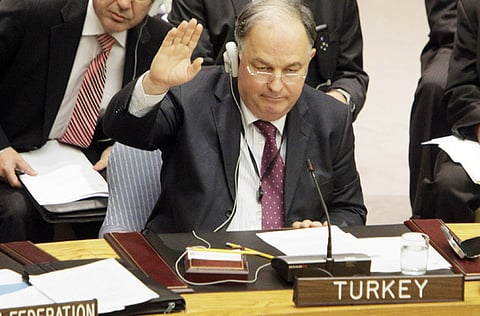UN hits Iran with new sanctions over nuclear program
UN Security Council slaps new sanctions on a defiant Iran; Turkey and Brazil vote against while Lebanon abstains

Dubai: Iran was slapped with the toughest set of sanctions it has faced to date following a UN Security Council vote Wednesday with Brazil and Turkey voting against the bill and Lebanon abstaining.
The resolution prompted an immediate response from Tehran, with foreign ministry spokesman Ramin Mehmanparast calling the vote an "incorrect" step that would further "complicate" the situation.
In addition to the sanctions passed yesterday, the EU is also planning to impose additional sanctions, to pressure Iran to halt its nuclear programme. Iran insists it is within its rights to continue its nuclear programme and has always maintained it is meant for peaceful purposes.
Many experts believe the sanctions will have no effect on Iran's nuclear programme but would end up punishing the people of Iran. "All economic sanctions are not effective, if you look to prime examples such as Cuba, Iraq and Libya, but I think the West is running out of options," Mustafa Alani, programme director of the Security and Terrorism Studies at the Gulf News Research Centre in Dubai, told Gulf News.
"The only other option is military action, and it is extremely unfavourable among Security Council members during this time."
According to Catherine Ashton, the European Union's high representative for foreign affairs, Britain, France and Germany would work closely with her to agree upon additional measures to pressure Iran — besides adding four more Iranian companies, including two banks and an insurance company — to a UN blacklist.
Blacklist expanded
As per the resolution, 40 companies including an Iranian bank were already on the list.
The sanctions would ban Iran from pursuing "any activity related to ballistic missiles capable of delivering nuclear weapons," bar Iranian investment in activities such as uranium mining, and prohibit Iran from buying several categories of heavy weapons including attack helicopters and missiles.
The US ambassador to the UN, Susan Rice hailed the vote, saying: "The council has risen to its responsibilities. Now Iran should choose a wiser course."
However, the vote was delayed for more than an hour after the ambassadors of Brazil, Turkey and Lebanon, three non-permanent members of the Security Council, said they were awaiting instructions from their governments. The three countries finally decided to attend the meeting, but insisted on speaking before the vote to register their opposition.
"We do not see sanctions as an effective instrument in this case," Brazil's UN ambassador Maria Luiza Viotti said. Despite the sanctions, France said it hoped "the door of dialogue would remain open" with Iran. The US, France Britain and Germany had wanted even tougher measures — some targeting Iran's energy sector — but Beijing and Moscow succeeded in diluting the steps outlined in the 10-page resolution.
Restrictions at a glance
- The fourth set of sanctions are considered to be the toughest yet, and will essentially double the number of entities under sanctions from 35 to 75.
- 40 companies blacklisted, with 15 linked to Iran's Revolutionary Guards.
- Javad Rahiqi, who heads Iran's Atomic Energy Organisation at Esfahan Nuclear Technology Centre has been added to the previous list of 40 Iranians subject to asset freeze.
- Tehran barred from pursuing "any activity related to ballistic missiles capable of delivering nuclear weapons".
- Barred from investing in uranium mining.
- Tehran prohibited from buying several categories of heavy weapons like attack helicopters and missiles.
Sign up for the Daily Briefing
Get the latest news and updates straight to your inbox



